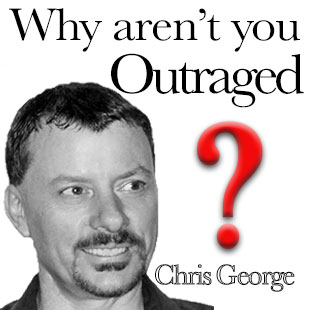
(CHRIS GEORGE / iNFOnews.ca)
October 30, 2018 - 12:00 PM
OPINION
There are two forms of power in the world; authoritative and allocative.
Authoritative is the one we were taught about in school. The system of governments, their history and traditions, and especially the nebulous idea of democracy and how the state is a just representation of our common interests. At the core of this justification is the idea of one man, one vote. All of our voices are to be given equal weight in our collective affairs and once we have spoken even the mighty must hesitate if they think to oppose us or our representatives in the legislatures across this land.
I think we are at a bit of a crisis point for those who would have us think like that, at least when it comes to the privileges that our system has come to bestow on some at the expense of all.
It is important to be clear on just what power is. A good concise definition is that power is the ability to get things done in society, whether it be a family, a community, a region, or a nation in scale.
Power relationships abound in every institution and organization we create. The flattening of that relationship with regard to our government at whatever level is what democratic legitimation is all about. The power is ideally shared equally across the citizenry and the collective interest is seen as what people choose when they elect politicians and parties to be their representatives.
Lost is the idea that our representatives themselves should represent us all collectively. We have created a system where political parties appear to vie for an endless series of four-year dictatorships.
An increasing number of citizens have come to feel that this system does nothing to represent them and have chosen to opt out of the voting process. In fact, if these people voted as a bloc, they would win pretty much every election hands down. The danger, from the point of view of political parties, is that enough people will stop voting to remove even the patina of legitimacy our current electoral system provides.
An even bigger danger for those benefiting most from the system is that all those people who don't vote suddenly decide to.
And make no mistake about it. Those who benefit most from our collective exercise of authoritative power just happen to be those who hold the other type of power.
Allocative power, or the power of wealth to get things done in society, has come to increasingly oppose any notion of collective interest and has prioritized the interests of those with "more skin in the game". A bigger bank account means a louder voice and that means a smaller voice for each and every other citizen who lacks that wealth and the influence it can purchase. The system itself chews away at democratic legitimacy with historic levels of inequity and inequality rampant across the world.
The proportional representation (PR) question in British Columbia today strikes at the core of this issue.
PR promises to give a voice to a greater diversity of opinion and at the same time encourage more people to vote as they may feel that their voice will be more fairly represented by the system. The blow to those with allocative power comes from the fact that no longer will 100 per cent of the power flow to a party like the federal Liberals when they really only mustered 26.9 per cent of the registered vote.
This decentralization of power means that no longer would a carefully targeted "investment" in a political party "get things done". Under proportional representation, the coin of the realm becomes transparency, compromise, and cooperation.
A quick peek at the desperation of the "no" side shows that the same low information, high emotional impact appeals that work so well to mobilize a quarter of the population during elections is being used in this campaign. Fear sells, which is why we see it implemented so often across the world as a political strategy. And thanks to that pesky political contribution legislation the Barrett government passed two generations ago in British Columbia, we have a pretty good idea about who is funding that side of the campaign.
A more engaged electorate is bad news for our monied elites, no matter who that electorate might vote for in an election. A more balanced legislature in Victoria will ensure that more British Columbian voices will be heard as our representatives seek to represent ALL of us in order to get the support they need to continue in their chosen careers. It will make it much more difficult to gain dictatorial power by appealing to narrow ideologies that only one in four of us really support.
As Warren Buffet once said, “There’s class warfare, but it’s my class, the rich class, that’s making war, and we’re winning.” Proportional representation will restore legitimacy to our "democratic tradition" while frustrating the few who have traditionally enjoyed a disproportionate share of the benefits of our political economy in British Columbia.
Vote yes for a better democracy.
— Chris George believes one measure of a just society is found in how well it balances fiscally conservative economics with social responsibility and environmental soundness in all of its living arrangements.
We welcome your comments and opinions on our stories but play nice. We won't censor or delete comments unless they contain off-topic statements or links, unnecessary vulgarity, false facts, spam or obviously fake profiles. If you have any concerns about what you see in comments, email the editor.
News from © iNFOnews, 2018